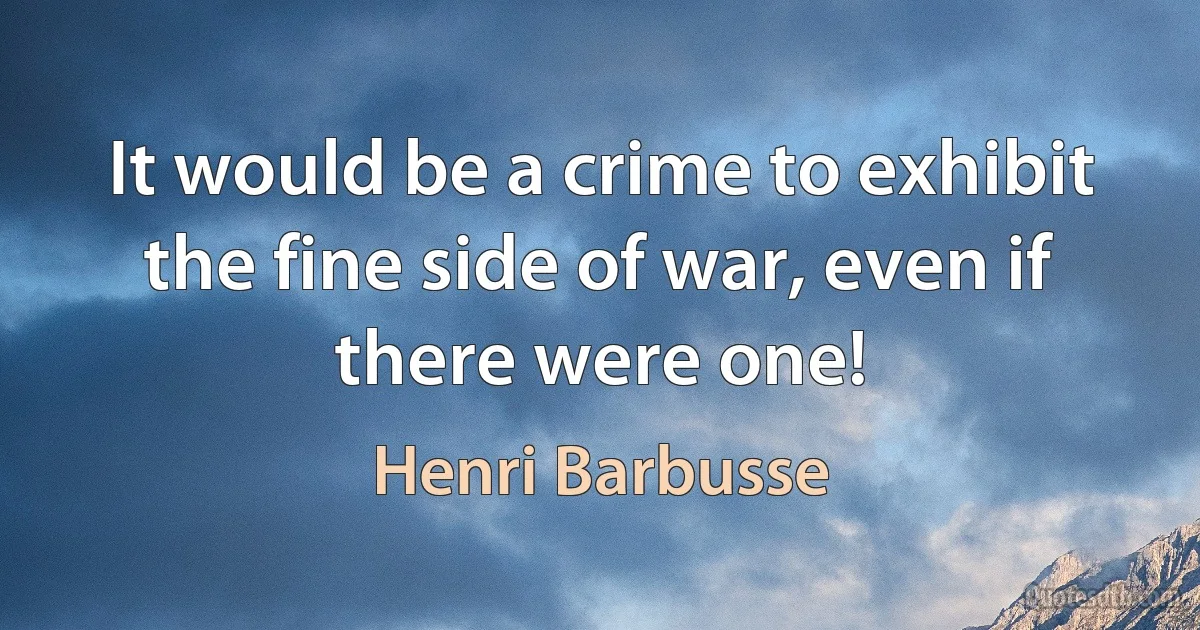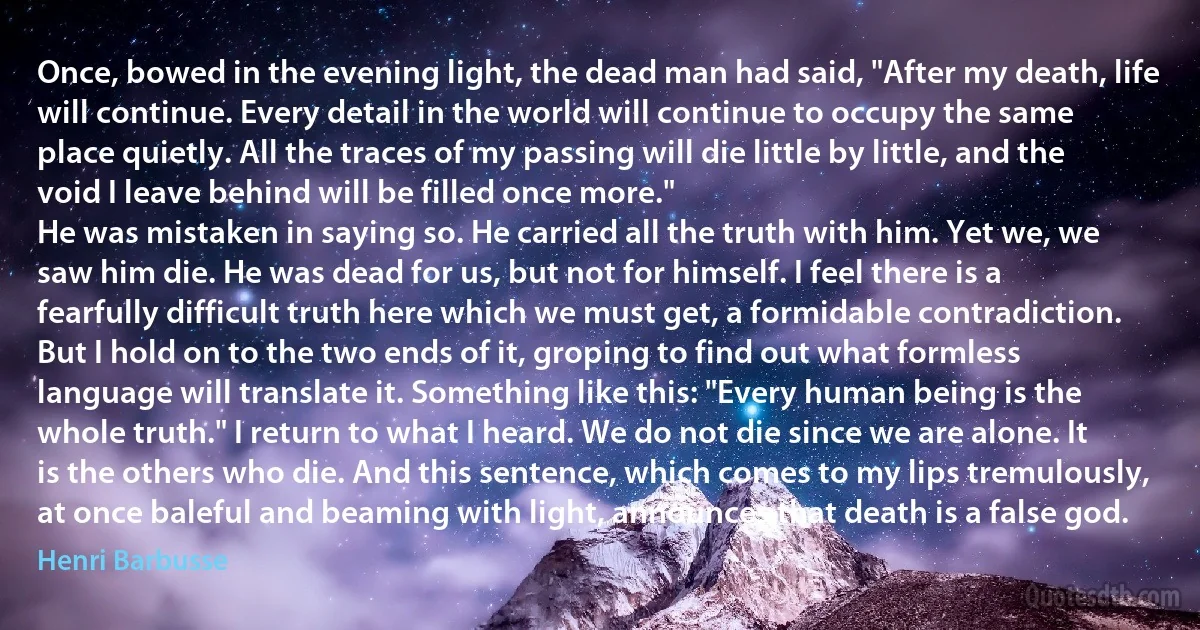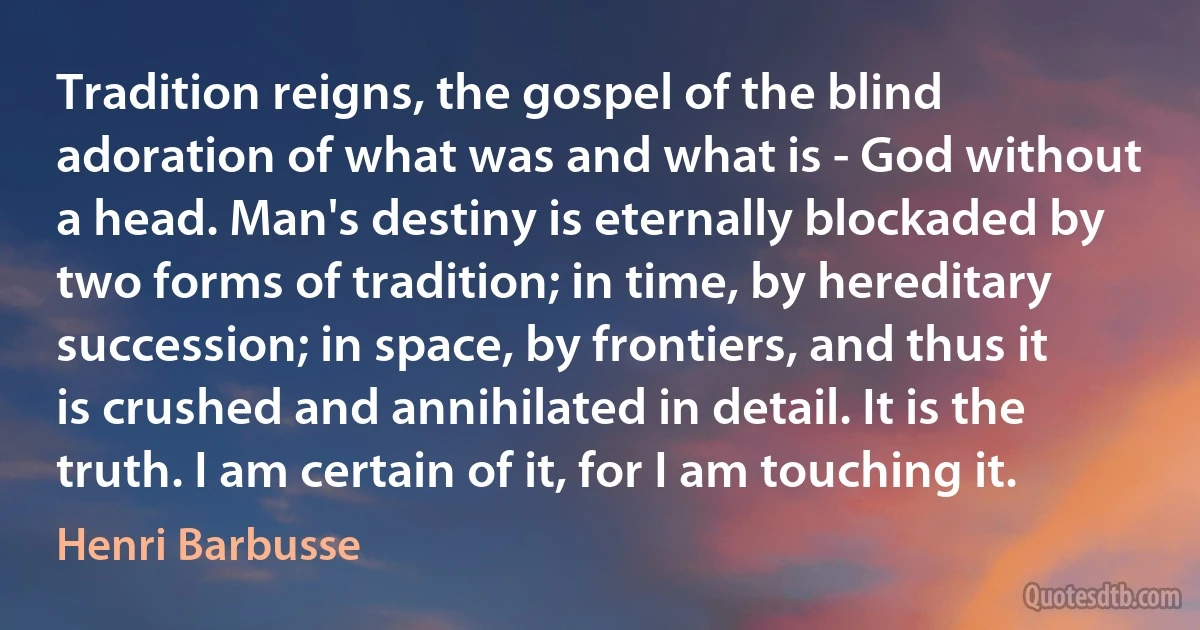Henri Barbusse quotes - page 9
Ah, there are cloudy moments when one asks himself if men do not deserve all the disasters into which they rush! No - I recover myself - they do not deserve them. But we, instead of saying "I wish" must say "I will." And what we will, we must will to build it, with order, with method, beginning at the beginning, when once we have been as far as that beginning. We must not only open our eyes, but our arms, our wings.

Henri Barbusse
His history is a series of victories over a series of tremendous difficulties. Since 1917, not a single year of his career has passed without his having done something which would have made any other man famous. He is a man of iron. The name by which he is known describes it: the word Stalin means "steel" in Russian. He is as strong and yet as flexible as steel. His power lies in his formidable intelligence, the breadth of his knowledge, the amazing orderliness of his mind, his passion for precision, his inexorable spirit of progress, the rapidity, sureness and intensity of his decisions, and his constant care to choose the right men.

Henri Barbusse
Paradis, possessed by his notion, waved his hand towards the wide unspeakable landscape. and looking steadily on it repeated his sentence, 'War is that. It is that everywhere. What are we, we chaps, and what's all this here? Nothing at all. All we can see is only a speck. You've got to remember that this morning there's three thousand kilometers of equal evils, or nearly equal, or worse."
"And then," said the comrade at our side, whom we could not recognize even by his voice, "to-morrow it begins again. It began again the day before yesterday, and all the days before that!"

Henri Barbusse
"When all men have made themselves equal, we shall be forced to unite."
"And there'll no longer be appalling things done in the face of heaven by thirty million men who don't wish them."
It is true, and there is nothing to reply to it. What pretended argument or shadow of an answer dare one oppose to it - "There'll no longer be the things done in the face of heaven by thirty millions of men who don't want to do them!"
Such is the logic that I hear and follow of the words, spoken by these pitiful fellows cast upon the field of affliction, the words which spring from their bruises and pains, the words which bleed from them.
Now, the sky is all overcast. Low down it is armored in steely blue by great clouds. Above, in a weakly luminous silvering, it is crossed by enormous sweepings of wet mist. The weather is worsening, and more rain on the way. The end of the tempest and the long trouble is not yet.

Henri Barbusse
Moving in both directions, the street is full of dresses which sway, offering themselves airily, the skirts lifting; dresses which lift and yet do not lift.
In the tall and narrow shop mirror I see myself approaching, rather pale and heavy-eyed. It is not a woman I want - it is all women. And I seek for them in those around me, one by one...

Henri Barbusse
What am I? I am the desire not to die. I have always been impelled - not that evening alone - by the need to construct the solid, powerful dream that I shall never leave again. We are all, always, the desire not to die. This desire is as immeasurable and varied as life's complexity, but at bottom this is what it is: To continue to be, to be more and more, to develop and to endure. All the force we have, all our energy and clearness of mind serve to intensify themselves in one way or another. We intensify ourselves with new impressions, new sensations, new ideas. We endeavour to take what we do not have and to add it to ourselves. Humanity is the desire for novelty founded upon the fear of death. That is what it is.

Henri Barbusse
A stupor and a sort of shame overwhelmed me as I heard that man trying to extract the utmost entertainment possible from the dark happenings that had been torturing me for a month.
I thought of that great voice, now silenced, which had said so clearly and forcefully that the writers of to-day imitate the caricaturists.
I, who had penetrated into the heart of humanity and returned again, found nothing human in this jiggling caricature! It was so superficial that it was a lie.
He said in front of me - of me the awful witness:
"It is man stripped of all outward appearances that I want people to see. Others are fiction, I am the truth."

Henri Barbusse
I come back as I always do to the greatness of mankind's curse, and I repeat it with the monotony of those who are always right - oh, without God, without a harbour, without enough rags to cover us, all we have, standing erect on the land of the dead, is the rebellion of our smile, the rebellion of being gay when darkness envelops us. We are divinely alone, the heavens have fallen on our heads.

Henri Barbusse
I have only one recourse, to remember and to believe. To hold on with all my strength to the memory of the tragedy of the Room.
I believe that the only thing which confronts the heart and the reason is the shadow of that which the heart and the reason cry for. I believe that around us there is only one word, the immense word which takes us out of our solitude, NOTHING. I believe that this does not signify our nothingness or our misfortune, but, on the contrary, our realisation and our deification, since everything is within us.

Henri Barbusse
A couple, a man and a woman - poor human beings almost always go in pairs - approached, and passed. I saw the empty space between them. In life's tragedy, separation is the only thing one sees. They had been happy, and they were no longer happy. They were almost old already. He did not care for her, although they were growing old together. What were they saying? In a moment of open-heartedness, trusting to the peacefulness reigning between them at that time, he owned up to an old transgression, to a betrayal scrupulously and religiously hidden until then. Alas, his words brought back an irreparable agony. The past, which had gently lain dead, rose to life again for suffering. Their former happiness was destroyed. The days gone by, which they had believed happy, were made sad; and that is the woe in everything.

Henri Barbusse
On Sundays, among the crowds, I have often felt my heart tighten with distress as I watch the unknown women. Reverie has often held me all day because of one who has gone by and disappeared, leaving me a clear vision of her curtained room, and of herself, vibrating like a harp. She, perhaps, was the one I should have always loved; she whom I seek gropingly, desperately, from each to the next. Ah, what a delightful thing to see and to think of a distant woman always is, whoever she may be!
There are moments when I suffer, and am to be pitied. Assuredly, if one could read me really, no one would pity me. And yet all men are like me. If they are gifted with acceptable physique they dream of headlong adventures, they attempt them, and our heart never stands still. But no one acknowledges that, no one, ever.

Henri Barbusse
The horse has not stopped bleeding. Its blood falls on me drop by drop with the regularity of a clock, - as though all the blood that is filtering through the strata of the field and all the punishment of the wounded came to a head in him and through him. Ah, it seems that truth goes farther in all directions than one thought! We bend over the wrong that animals suffer, for them we wholly understand.
Men, men! Everywhere the plain has a mangled outline. Below that horizon, sometimes blue-black and sometimes red-black, the plain is monumental!

Henri Barbusse
I felt the beginning of a farewell rise in me like a sob. But there are too many of them for one to mourn them all. How many of them are there on all this plain? How many, how many of them are there in all this moment? Our heart is only made for one heart at a time. It wears us out to look at all. One may say, "There are the others," but it is only a saying. "You shall not know; you shall not know."

Henri Barbusse
All is madness. And there is no one who will dare to rise and say that all is not madness, and that the future does not so appear - as fatal and unchangeable as a memory.
But how many men will there be who will dare, in face of the universal deluge which will be at the end as it was in the beginning, to get up and cry "No!" who will pronounce the terrible and irrefutable issue: -
"No! The interests of the people and the interests of all their present overlords are not the same.

Henri Barbusse
She goes into her room and disappears. Before I went to the war we slept in the same bed. We used to lie down side by side, so as to be annihilated in unconsciousness, or to go and dream somewhere else. Commonplace life has shipwrecks worse than in Shakespearean dramas. For man and wife - to sleep, to die.) But since I came back we separate ourselves with a wall.

Henri Barbusse
It terrifies one to think for how short a time science has been methodical and of useful industry; and after all, is there anything on earth more marvelously easy than destruction? Who knows the new mediums it has laid in store? Who knows the limit of cruelty to which the art of poisoning may go? Who knows if they will not subject and impress epidemic disease as they do the living armies - or that it will not emerge, meticulous, invincible, from the armies of the dead? Who knows by what dread means they will sink in oblivion this war, which only struck to the ground twenty thousand men a day, which has invented guns of only seventy-five miles' range, bombs of only one ton's weight, aeroplanes of only a hundred and fifty miles an hour, tanks, and submarines which cross the Atlantic? Their costs have not yet reached in any country the sum total of private fortunes.

Henri Barbusse
If, from the idea of motherland, you take away covetousness, hatred, envy and vainglory; if you take away from it the desire for predominance by violence, what is there left of it?
It is not an individual unity of laws; for just laws have no colors. It is not a solidarity of interests, for there are no material national interests - or they are not honest. It is not a unity of race; for the map of the countries is not the map of the races. What is there left?
There is left a restricted communion, deep and delightful; the affectionate and affecting attraction in the charm of a language - there is hardly more in the universe besides its languages which are foreigners - there is left a personal and delicate preference for certain forms of landscape, of monuments, of talent. And even this radiance has its limits. The cult of the masterpieces of art and thought is the only impulse of the soul which, by general consent, has always soared above patriotic littlenesses.

Henri Barbusse
You can form no idea of the beauty that is possible! You cannot imagine what all the squandered treasure can provide, what can be brought on by the resurrection of misguided human intelligence, successively smothered and slain hitherto by infamous slavery, by the despicable infectious necessity of armed attack and defense, and by the privileges which debase human worth. You can have no notion what human intelligence may one day find of new adoration. The people's absolute reign will give to literature and the arts - whose harmonious shape is still but roughly sketched - a splendor boundless as the rest. National cliques cultivate narrowness and ignorance, they cause originality to waste away; and the national academies, to which a residue of superstition lends respect, are only pompous ways of upholding ruins.

Henri Barbusse
Against the window's still pallid sky I see her hair, silvered with a moonlike sheen, and her night-veiled face. Closely I look at the share of sublimity which she bears on it, and I reflect that I am infinitely attached to this woman, that it is not true to say she is of less moment to me because desire no longer throws me on her as it used to do. Is it habit? No, not only that. Everywhere habit exerts its gentle strength, perhaps between us two also. But there is more. There is not only the narrowness of rooms to bring us together. There is more, there is more! So I say to her:
"There's you."
"Me?" she says. "I'm nothing."
"Yes, you are everything, you're everything to me."

Henri Barbusse



